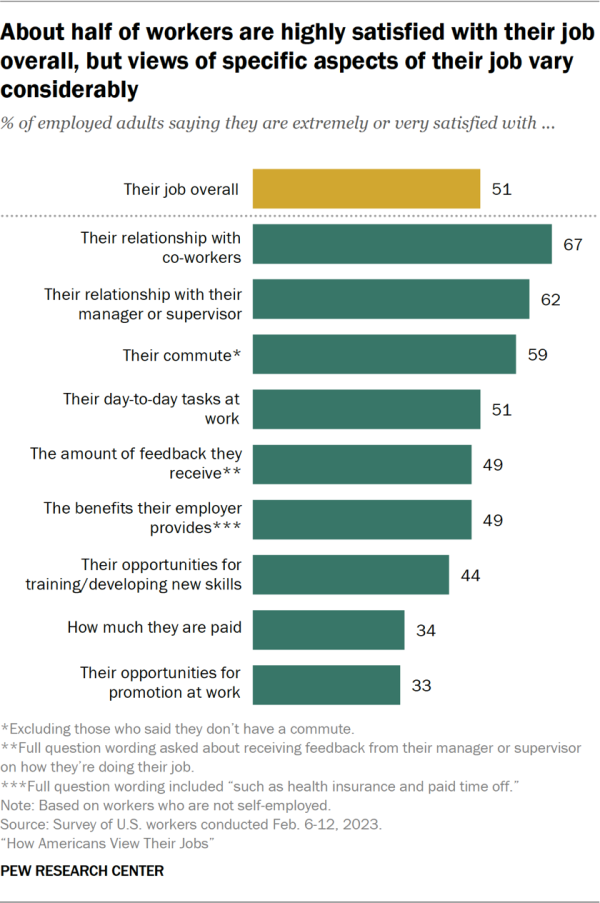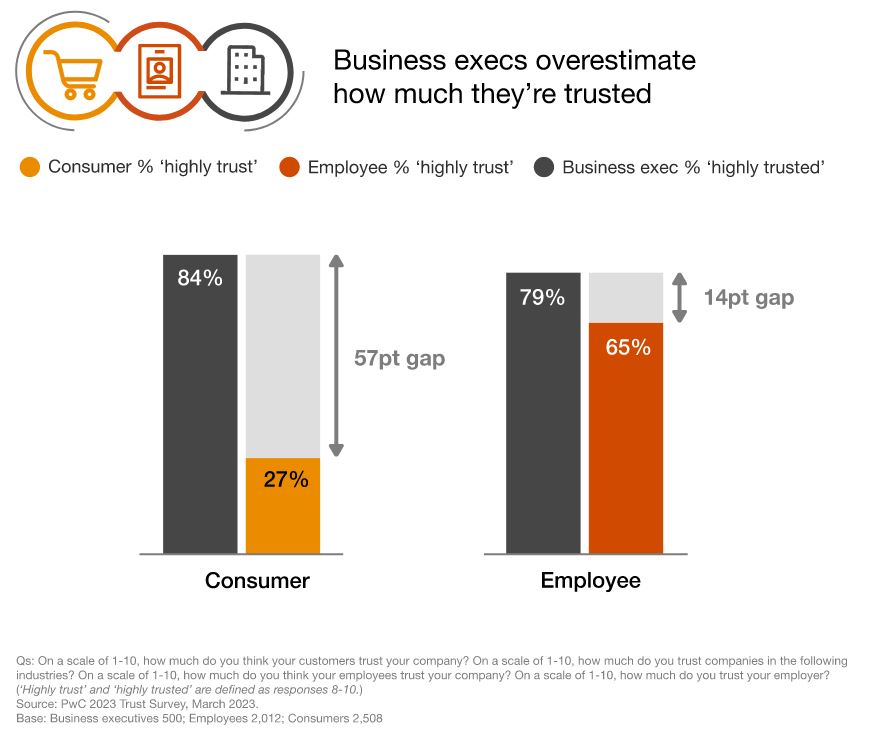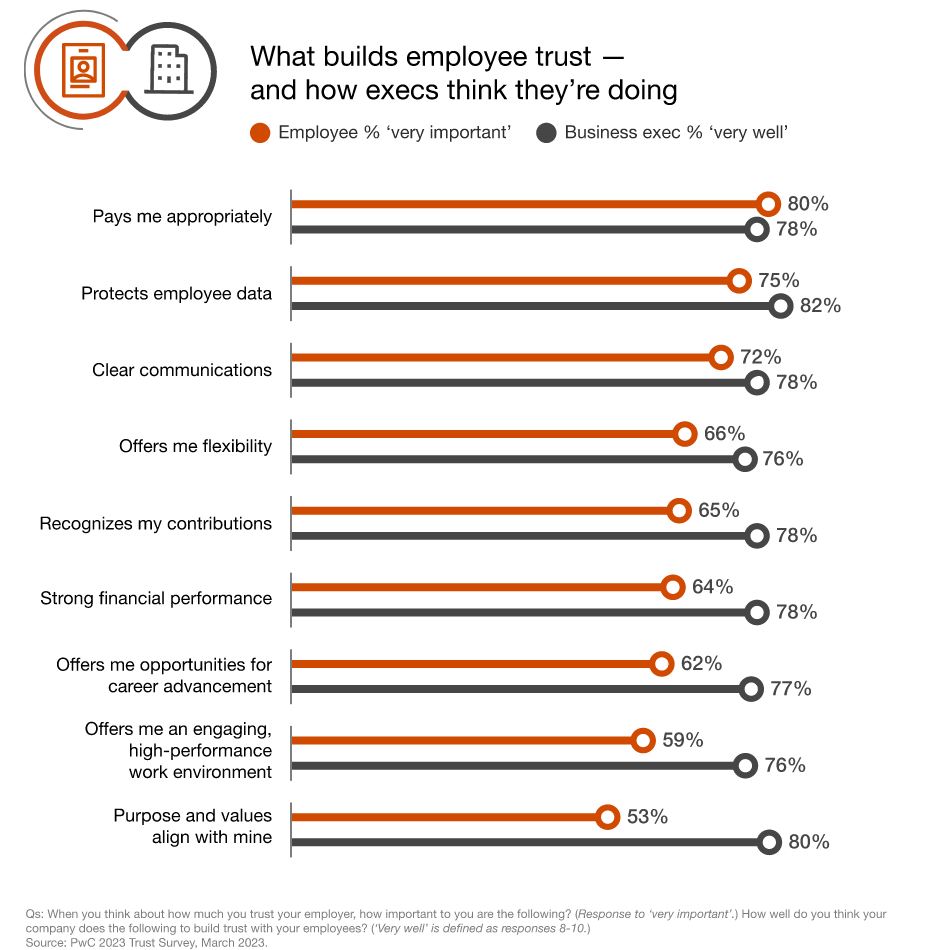Two recent surveys offer snapshots of how employees view their jobs and what drives employee trust in the workplace.
Every day, we still experience societal after-effects of living through the Covid19 pandemic. Not to imply that it is behind us, the disease remains among the leading causes of death here in the United States. Many continue to die or to suffer ongoing effects of a syndrome called “Long Covid.” But with vaccines and improved treatments, we are learning to adapt and “live around” the illness much as we do with influenza, AIDS, and other illnesses. Beyond just the health impact , the pandemic has had enormous impacts on our personal lives, the workplace, business and commerce, and our society and cultures at large. It will likely require much more time and distance to fully understand how. But we know that in the workplace alone, we had to adapt to remote work, followed by hybrid workplaces, challenges in recruitment and retention, “quiet quitting,” massive layoffs in the tech sector and in some other industries, just to name a few of the changes and challenges that have occurred.
This past Spring, two important surveys were released that offer insights for employers about the American workforce. They take on particular interest as we work to attain “a new normal.” in the wake of the pandemic and the huge disruption it had on the American workforce. The surveys offer snapshots of current attitudes on key matters and insight for employers on how to continue building back. .
- In March, the Pew Research Center released How Americans View Their Jobs. The purpose of the study was to learn more about the experiences of U.S. adults in the workplace, including how employees see their jobs, how they experience the workplace, and what access they have to employer sponsored benefits. The survey encompassed 5,188 U.S. adults who were working part time or full time, who were not self-employed, and who had only one job or had more than one but considered one to be their primary job.
- Also in the spring, PwC conducted its 2023 Trust Survey to examine what drives trust in business for employees and customers, and what businesses can do to build trust. This was the third time that PwC conducted such a survey, encompassing 500 business executives, 2,508 consumers and 2,012 employees in the United States.
For each survey, we’ll give a brief overview of some of the key findings, as well as lessons that they hold for employers, but we encourage you to read them both via the links provided above.
How Americans View Their Jobs – Pew Research Center
Only about half of U.S. workers say they are extremely or very satisfied with their job overall, according to the Pew Research Center survey. Even fewer express high levels of satisfaction with their opportunities for training and skills development, how much they are paid and their opportunities for promotion. Most workers say they are extremely or very satisfied with their relationship with their co-workers (67%) and with their manager or supervisor (62%). About seven-in-ten or more say they’re treated with respect (78%) and can be themselves at work (72%) all or most of the time, and majorities also say they have at least one close friend at work (65%) and that they feel their contributions at work are valued a great deal or a fair amount (62%).

On the other hand, satisfaction lags when it comes to pay, benefits, and opportunities for training and advancement.
Key findings include:
- Older workers offer the most positive assessments of their job.
- On many measures of workplace satisfaction, views differ widely by income.
- About four-in-ten workers (39%) say their job or career is extremely or very important to their overall identity.
- Black workers are the most likely to say they’ve been discriminated against in the workplace because of their race or ethnicity.
- Lower-income workers are less likely to have access to key employer-sponsored benefits.
- Most workers place a high priority on paid time off.
- Nearly half of workers who have paid time off say they typically take less time off than their employer offers.
PwC 2023 Trust Survey
The survey introduction explains why trust is important to every business: “Consumers, employees and business executives overwhelmingly agree that trust in business is imperative. The trust that businesses build with their stakeholders can boost profitability: 91% of business executives agree (including 50% who strongly agree) that their ability to earn and maintain trust improves the bottom line.”
The survey report is beautifully displayed and easy to read. While all constituents agree on the importance of trust to the health of an organization, responses show that business leaders significantly overestimate how much they are trusted by consumers and employees alike. While the gap in their perception vs the reality is greater with consumers, it is also significant with employees, as can be seen in this chart.

The report suggests that employees may be the key to bridging the trust gap, that employers must build trust within their own four walls by listening. “Through their day-to-day work, employees have firsthand information about potential blind spots that companies may face regarding trust. ”
In building trust with employees, the survey shows where the gaps lie. It is interesting that the largest gap falls in alignment of purpose and values.

There are other things that employers and HR managers may find noteworthy in this survey, worth noting in this survey including how executives miss opportunities to retain trust while doing layoffs, how taking a social stance affects trust among consumers and employees, and exploring how the newest risk related to trust is artificial intelligence (AI).
In its conclusion, the survey authors offer this trust playbook for leaders:
- Take ownership of trust.
- Treat trust as a team sport.
- Build your stakeholder engagement plan.
- Focus on outcomes.
- Activate trust.
- Prepare your crisis plans with trust in mind.
- Take action.


